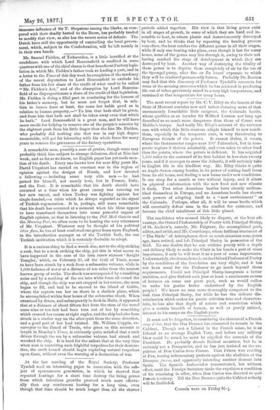At the last meeting of the Royal Society, Professor Tyndall
reed an interesting paPer in connexion with the sub- ject of spontaneous generation, in which he showed that repeated heatings for a short time destroy the living germs from which infectious growths proceed much more effectu- ally than any continuous heating for a long time, even though that time should be much longer than all the shorter
periods added together. His view is that living germs exist in all stages of growth, in some of which they are hard and in- sensible to heat, in others plastic and instantaneously destroyed by heat, and he thinks that by repeating the heating process very often, the heat catches the different germs in all their stages, while if only one beating take place, even though it last for many hours, some of the germs may live through it, owing to their not having reached the stage of development in which they are destroyed by heat. Another way of destroying the vitality of these germs is to deprive them completely of air by the use of the Sprengel pump, after five or ix hours' exposure to which they will be rendered permanently barren. Probably Dr. Bastian may find that this discovery of Professor Tyndall's accounts for some of the seeming successes which he has achieved in producing life out of tubes previously raised to a very high temperature, and sustained at that temperature for many hours.


































 Previous page
Previous page